英美国家概况资料精讲中文笔记
- 格式:doc
- 大小:108.00 KB
- 文档页数:17
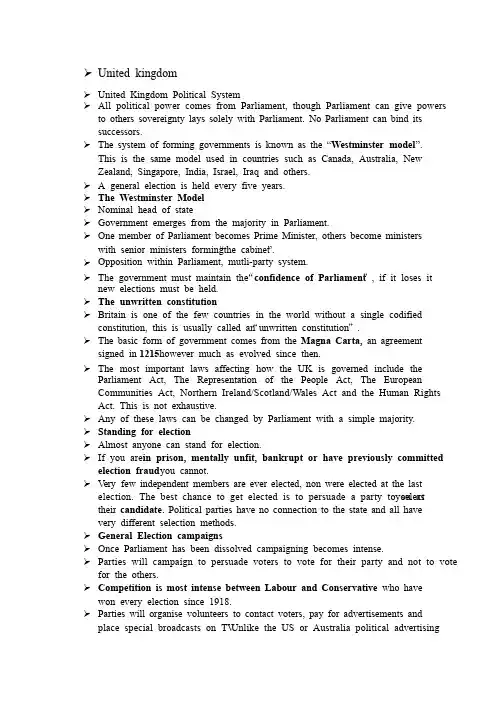
Ø United kingdom Ø United Kingdom Political System Ø All political power comes from Parliament, though Parliament can give powers to to others others others sovereignty sovereignty sovereignty lays lays lays solely solely solely with with with Parliament. Parliament. Parliament. No No No Parliament Parliament Parliament can can can bind bind bind its its successors. Ø The The system system system of of of forming forming forming governments governments governments is is is known known known as as as the the the ““Westminster Westminster model model ”. This This is is is the the the same same same model model model used used used in in in countries countries countries such such such as as as Canada, Canada, Canada, Australia, Australia, Australia, New New Zealand, Singapore, India, Israel, Iraq and others. Ø A general election is held every five years. Ø The Westminster Model Ø Nominal head of state Ø Government emerges from the majority in Parliament. Ø One One member member member of of of Parliament Parliament Parliament becomes becomes becomes Prime Prime Prime Minister, Minister, Minister, others others others become become become ministers ministers with senior ministers forming “the cabinet ”. Ø Opposition within Parliament, mutli-party system. Ø The government must maintain the “confidence of Parliament ”, if it loses it new elections must be held. Ø The unwritten constitution Ø Britain Britain is is is one one one of of of the the the few few few countries countries countries in in in the the the world world world without without without a a a single single single codified codified constitution, this is usually called an “unwritten constitution ”. Ø The The basic basic basic form form form of of of government government government comes comes comes from from from the the Magna Magna Carta,Carta, an an agreement agreement signed in 1215 h owever much as evolved since then. however much as evolved since then. Ø The most important laws affecting how the UK is governed include the Parliament Act, The Representation of the People Act, The European Communities Act, Northern Ireland/Scotland/Wales Act and the Human Rights Act. This is not exhaustive. Ø Any of these laws can be changed by Parliament with a simple majority. Ø Standing for election Ø Almost anyone can stand for election. Ø If you are in prison, mentally unfit, bankrupt or have previously committed in prison, mentally unfit, bankrupt or have previously committed election fraud y ou cannot. you cannot. Ø ery V ery few few few independent independent independent members members members are are are ever ever ever elected, elected, elected, non non non were were were elected elected elected at at at the the the last last election. The best chance to get elected is to persuade a party to select you as their candidate . . Political Political Political parties parties parties have have have no no no connection connection connection to to to the the the state state state and and and all all all have have very different selection methods. Ø General Election campaigns Ø Once Parliament has been dissolved campaigning becomes intense. Ø Parties will campaign to persuade voters to vote for their party and not to vote for the others. Ø Competition Competition is is is most most most intense intense intense between between between Labour Labour Labour and and and Conservative Conservative who who have have won every election since 1918. Ø Parties Parties will will will organise organise organise volunteers volunteers volunteers to to to contact contact contact voters, voters, voters, pay pay pay for for for advertisements advertisements advertisements and and place special broadcasts on TV . Unlike the US or Australia political advertising on TV is not allowed. Ø Money Money donated donated donated to to to parties parties parties has has has to to to be be be declared declared declared to to to the the the public public public and and and there there there are are are strict strict spending limits. Ø At the 2010 election the leaders of the three main parties took part in three live televised televised debates debates debates which which which followed followed followed the the the US US US model model model of of of Presidential Presidential Presidential debates. debates. debates. This This was a first for British politics. Ø During During an an an election election election period, period, period, usually usually usually the the the month month month before before before the the the polling polling polling day day day the the the news news cycle is dominated by election stories. Even the death of the Pope in 2005 barely managed to interrupt this. Ø During the campaign all parties usually publish a “manifesto ” a document containing the specific promises they will deliver if elected. This document document is is supposed to form the basis of the government if they are successful. Ø Opinion polls are are pieces pieces pieces of of of scientific scientific scientific research research research undertaken undertaken undertaken by by by market market market research research companies companies to to to give give give clues clues clues as as as to to to how how how people people people will will will vote. vote. vote. They They They usually usually usually give give give an an accurate picture of how the election will end, movement in the daily figures is closely watched by the media and politicians alike. In 1992 however the polls were very wrong and the result came as a great shock to many. Ø Since the 1980s much of the attention has focused on the personality of the party leaders and who would become the best Prime Minister. Ø The Parties – ConservativeØ The Conservative Party is Britain ’s oldest political party. Ø In the time before universal suffrage they represented Britain ’s upper class and aristocratic elites.Ø After all adults were given the vote they were forced to reinvent themselves as a part of cautious moderation, opposing radical politics and ideas. Generally being the “least political ” and least ideological of all the parties. They were a party of Christian values and moderate politics. Ø They They were were were transformed transformed transformed again again again under under Margaret Thatcher who who injected injected injected the the American free market philosophy into into the the the party. party. party. This This This thinking thinking thinking has has has come come come to to dominate the modern Conservative Party. Ø They are also called the “Tories ” or “Tory Party ” (托利)a word coming from from the the the Irish Irish Irish language language language meaning meaning meaning robber robber robber or or or bandit. bandit. bandit. Meant Meant Meant as as as an an an insult insult insult it it it is is commonly used today by many Conservatives themselves. Ø Conservatives believe in a “laissez faire ” (放任主义) society. Ø Mrs Thatcher famous said Conservatives believed in “rolling back the boundaries of the state ”. Ø Conservatives support a free market economy with little state ownership, greater competition, lower taxes and fewer rules. Ø Conservatives Conservatives often often often believe believe believe that that that giving giving giving people people people responsibility responsibility responsibility and and and not not not being being dependent on the state will give them more freedom to better themselves. Ø Socially conservative ideas have recently been dropped in favour of more liberal ideas such as same sex marriage however the party remains divided over this. Ø Though Though previously previously previously strongly strongly strongly pro pro pro European European European the the the party party party has has has moved moved moved to to to be be be more more Euro-sceptic and now is offering a vote on continued membership of the EU. Ø LabourØ The Labour Party was formed by Trade Unions in 1901.When working class people people were were were given given given the the the right right right to to to vote vote vote they they they overwhelmingly overwhelmingly overwhelmingly did did did for for for the the the Labour Labour party and continue to do so today. Ø The Labour Party ’s beliefs are summed up in Clause 4 of the party Rulebook. Ø “””The Labour Party is a democratic democratic socialistparty. socialist party. It It believes that by the strength of our common endeavour we achieve more than we achieve alone, so as to create for each of us the means to realise our true potential and for all of us a community in which power, wealth and opportunity are in the hands of the many, not the few, where the rights we enjoy reflect the duties we owe, andwhere we live together, freely, in a spirit of solidarity, tolerance and respect.”””Ø Labour has also been at the forefront of liberation struggles such as women ’sequality, racial equality, gay equality and the rights of disabled people.Ø Labour champions its achievements in govermnet of expanding public services, introducing the minimum wage, helping the lowest paid, strengthening rights at work and expanding education opportunities especially at the bottom of society. Labour ’s state goal is to created a “fairer societyØ Liberal DemocratsØ The third party, also known as the “Lib Dems ”. Ø Their party e ntered entered government in 2010 for the first time since 1916, they are the junior coalition partner. Ø They have favoured radical constitutional change, free higher education andlower taxes on the poor.Ø Accused of abandoning their beliefs to form a government with the Conservatives Conservatives they they they have have have lost lost lost much much much of of of their their their former former former support, support, support, especially especially especially among among younger people. Ø They had become a “protest party ” getting support from many people who dislike British politics. Ø They have strong support for civil liberties, human rights and theenvironment . Ø Class in the UKØ Class in Britain has traditionally been described as being split between upperclass, middle class and working class.Ø Today the gap between working class and middle class can be blurred. Ø Distinct cultural groups, accents and characteristics can can be be be identified identified identified from from class. Ø It continues to be a significant part of life in the UK but in a smaller way than in previous generations. Ø The Conservatives generally have the support of the upper classes, Labour of the working class and all three parties battle for middle class support. Ø Class Class is is is complex complex complex and and and difficult difficult difficult to to to define. define. define. The The The divide divide divide between between between blue blue blue collar collar collar and and white collar is not always the way to decide. Ø A skilled manual worker such as a plumber may earn significantly more than a white collar worker such as a teacher however the latter is more likely to call themselves “middle class ”. Ø Differences in the use of language, tastes, interests and politics are often usedto describe.Ø Some people refuse to be labelled as either working class or middle class. Ø Traditionally Traditionally working working working class class class people people people did did did not not not go go go to to to University University University however however however this this this has has greatly changed in the last 10 years breaking down many barriers. Ø Former Former Prime Prime Prime Minister Minister Minister Tony Tony Tony Blair Blair Blair stated stated stated he he he wished wished wished for for for everybody everybody everybody to to to become become Middle Class. Ø After the economic restructuring of the 1980s some people in inner cities do not work and live from state handouts . Labour calls these the “socially excluded ”, some others refer to them unflattering as an “underclass ”. There has been great tension within working class communities with being unemployed often seen as a great badge of shame. Ø The The British British British upper upper upper class class class or or “elite ” are a small group of people either connected to the ancient aristocracy or who attends a small number of eliteand expensive schools. The most famous of these is Eton. They then usually go . The most famous of these is Eton. They then usually go on to study at either Oxford or Cambridge University. Ø Current Current Prime Prime Prime Minister Minister Minister David David David Cameron Cameron Cameron went went went to to to this this this school school school as as as have have have several several previous previous Prime Prime Prime Ministers Ministers Ministers and and and many many many other other other powerful powerful powerful politicians politicians politicians and and and business business leaders. They have come to be called the “power elite ”. Ø Though Though Labour Labour ’s s support support support comes comes comes mainly mainly mainly from from from the the the working working working class class class most most most of of of its its leaders leaders and and and politicians politicians politicians have have have come come come from from from the the the middle middle middle class class class but but but rarely rarely rarely the the the power power elite. Some e xceptions exceptions exist such as Tony Blair. In the Labour party sending your children to a private school usually will end your political career.Ø Race in the UKØ Throughout history the UK has been an almost exclusively …white‟ country made up of different northern European groups. Ø Immigration Immigration from from from the the the British British British Empire Empire Empire started started started in in in the the the 19th 19th 19th Century Century Century however however greatly accelerated after the second world war. Ø The The main main main sources sources sources of of of immigration immigration immigration were were were from from from places places places such such such as as India, Pakistan,British African colonies . Hong Kong became a route for Chinese immigration . Hong Kong became a route for Chinese immigration to the UK. Ø Jewish refugees fleeing Nazi Germany and the Soviet Union settled mainly in London London and and and Manchester Manchester Manchester though though though many many many more more more simply simply simply passed passed passed through through through Britain Britain Britain on on route to Israel or the US. Ø Today the biggest source of migration is from Eastern Europe. Ø Immigration in the 1950s and 60s greatly transformed many aspects of the UK and introduced “racial politics ” for the first time in British history.Britain has had no historical record of institutional racism such as segregation or mixed marriage laws.Ø Racism: a backlashØ Immigrants largely took low skilled jobs to deal with Britain ’s post war labour shortage. Immigrants became part of the “working class”, during the boom years of of the the the 50s 50s 50s and and and early early early 60s 60s 60s this this this worked worked worked well. well. well. When When When the the the economy economy economy was was was less less successful and jobs were more scarce tensions between “native ” and “immigrant” “immigrant” groups groups groups became became became worse. worse. worse. Some Some Some politicians politicians politicians attempted attempted attempted to to to exploit exploit exploit this this however the main parties resisted. Ø One One Conservative Conservative Conservative minister minister minister was was was fired fired fired for for for making making making a a a famous famous famous “rivers “rivers “rivers of of of blood” blood” speech, another Conservative politician was disciplined for using the slogan “if you want a nigger neighbour vote Labour ”. Ø The National Front, a party linked to the ideas of Adolph Hitler was the only organised force against immigration in the 70s and 80s. Ø Today the British National Party are a small fringe party calling for an end to are a small fringe party calling for an end to immigration and wanting an “all white Britain ”. A similar far right group called the “English Defence League ” stages stages protests protests protests in in in cities cities cities against against against immigrant immigrant groups. Both are seen as racists by most British people and have little support. Ø Black and Asians (Indian subcontinent) are now more likely to University and enter the middle class than in the past. Ø All All political political political parties parties parties now now now have have have senior senior senior Black Black Black and and and Minority Minority Minority Ethnic Ethnic Ethnic (BAME) (BAME) members. Ø The treatment of minorities by the police has been a source of tension. Ø IrelandØ Early HistoryØ Ireland was populated by Celtic tribes. Ø Christianity was brought to to Ireland from England by Ireland from England by St Patrick and others in the 5th Century. Ø Ireland quickly became a deeply Christian nation. Ø Following the N orman Norman Conquest o f Britain the Normans arrived in Ireland and of Britain the Normans arrived in Ireland and eventually established their own rule there. Ø In 1171 the Norman King of England Henry II established himself as the‘overlord ’ of Ireland.Ø This started 800y ears of English involvement in Ireland. years of English involvement in Ireland. Ø The The ruling ruling ruling Norman Norman Norman families families families eventually eventually eventually become become become more more more Irish Irish Irish through through through cultural cultural assimilation. By 15th Century only the area around Dublin was controlled by the EnglishCrown Ø Henry VIIIØ In 1541 Henry declared himself King of Ireland.Ø Henry launched campaigns to extend his rule in Ireland. Ø Henry VIII changed England ’s s official religion from official religion from C atholic (Catholic (天主教的) to Protestant (新教徒). Ø Henry Henry sent sent sent settlers settlers settlers to to to Ireland. Ireland. Ireland. Eventually Eventually Eventually other other other English English English monarchs monarchs monarchs sent sent sent more more including more protestants. Ø Oliver CromwellØ Cromwell led the Parliamentary Army during the English civil war. Ø Cromwell was a deeply religious protestant “puritan ” and saw the defeated King Charles as someone influenced by Catholics. Ø The Irish had supported the King during the English civil war. Ø Following the war Cromwell sent his forces to re-conquer Ireland. Ø Their Their methods methods methods were were were brutal, brutal, brutal, combined combined combined with with with causing causing causing a a a famine famine famine and and and a a a subsquent subsquent outbreak of plague it led to the population of Ireland to drop by up to 20%. Ø Cromwell is still a hated historical figure in Ireland today. Ø Religious Religious divides divides divides between between between Catholics Catholics Catholics and and and Protestants Protestants Protestants in in in Britain Britain Britain led led led the the the British British establishment establishment to to to worry worry worry about about about the the the role role role of of of Irelands Irelands Irelands Catholics Catholics Catholics in in in any any any plot plot plot by by Catholics to take the throne. Ø Harsh penal laws were introduced which targeted Catholics such as preventing land ownership. Ø Influence from the American revolution led to Ireland being granted a form of independence with a a shared king but separate ParliamentØ Act of UnionØ Ideas Ideas contained contained contained in in in the the the French French French Revolution Revolution Revolution specifically specifically specifically the the the slogan slogan “Liberty, Equality, Fraternity ” began to affect the Irish political thinking. Ø In order to counter this London decided Ireland should not be a colony but a full part of the United Kingdom. Ø After After defeating defeating defeating a a a rebellion rebellion rebellion they they they enacted enacted the Act of Union which created theUnited Kingdom of Great Britain and Ireland.Ø The Potato FamineØ During During the the the Napoleonic Napoleonic Napoleonic wars wars wars the the the economy economy economy of of of Ireland Ireland Ireland had had had changed changed changed hugely hugely hugely and and moved away from agriculture. Ø The The rapidly rapidly rapidly expanding expanding expanding population population population however however however was was was still still still largely largely dependent dependent on on potatoes as a staple of their diet. Ø Food shortages during the 19th Century led to a belief that Britain simply didnot care about the Irish people dying of hunger.Ø This led to very strong calls within Ireland for “Home Rule ” and and a a government which could be more responsive to Irish needs. Ø Home RuleØ The Irish Parliamentary Party called for Home Rule. Ø Sinn Fein believed in an independent Ireland.Ø Sinn Sinn Fein Fein Fein believed believed believed MPs MPs MPs elected elected elected should should should not not not attend attend attend Parliament Parliament Parliament and and and their their their policy policy was to “ignore ” British rule in Ireland. Ø Sinn Fein had close links with the Irish Republican Army (IRA). Ø Eventually Eventually despite despite despite opposition opposition opposition from from from Conservatives Conservatives Conservatives and and and the the the House House House of of of Lords Lords Lords a a Home Rule bill was passed and became law. Ø In 1914 the First World War started and Home Rule was put onhold . Ø In 1916 a a further further further rebellion rebellion rebellion in in in Dublin Dublin Dublin was was was defeated defeated defeated by by by the the the British British British however however however a a decision to execute the captured leaders led to a massive public backlash within Ireland the start of the end of British rule. Ø After the warØ Home Rule was implemented however Sinn Fein had now gained huge support following the Easter Uprising in 1916. Ø Sinn Fein members established their own Parliament the “D áil Éireann ”, their own government and refused to recognise the “forces of occupation ” within Ireland. Ø An aggressive campaign by the IRA led to Britain to negotiate with Sinn Fein and the IRA. Ø Sinn Fein President Eamon de Valera sent an IRA commander called MichaelCollins to London to negotiate.Ø Anglo Irish TreatyØ As expected the British were not prepared to offer the creation of Irish Republic however did go far enough to win agreement from many in Ireland. Ø In 1920 t hey agreed to create an they agreed to create an “Irish Free State ” which would make Ireland a a Dominion Dominion Dominion similar similar similar to to to Canada. Canada. Canada. The The The King King King would would would remain remain remain head head head of of of state state state and and and the the Northern Six Counties would be able to remain in the UK. Ø The decision on whether to accept the treaty deeply split Sinn Fein and Ireland Sinn Fein and Ireland as a whole Ø Irish Civil WarØ Michael Collins signed the treaty, the Dail voted narrowly in favour however President de Valera refused to recognise it and his supporters withdrew from the Dail. Ø Irish people voted overwhelmingly in favour of the treaty however the threat of “unimaginable ” war from Britain influenced this. Ø In In January January January 1922 1922 1922 the the the British British British formally formally formally handed handed handed over over over Dublin Dublin Dublin Castle Castle Castle to to to Michael Michael Collins who became the leader of the Irish Free State. Ø The The IRA IRA IRA and and and Sinn Sinn Sinn Fein Fein Fein split split split between between between those those those in in in favour favour favour of of of the the the treaty treaty treaty and and and those those against it. They fought a brief but bloody war against each other. Ø Irish Free State to the RepublicØ Following peace between the two sides Sinn Fein broke into two parties. Fiana Fail and Fine Gael(爱尔兰统一党), they continue to be the main two parties in Ireland today. Ø De Valera became Prime Minister of Ireland and gradually made changes to the constitution in agreement with London. Ø In In 1949 1949 1949 Ireland Ireland Ireland formally formally formally broke broke broke all all all links links links with with with Britain Britain Britain and and and declared declared declared the the the Irish Irish Republic. They made a territorial claim over Northern Ireland. ØØØØØØØØØØ United kingdom of Great Britain & Northern Ireland Ø England, Wales, Scotland, Northern Ireland Ø “Great Britain” refers to England, Wales & Scotland. Ø “British Isles” Refers to the UK and Republic of Ireland. Ø Main Main language, language, language, English English English (British). (British). (British). Other Other Other official official official languages languages languages include include include Welsh, Welsh, Welsh, Scots, Scots, Scots, Ulster Ulster Scots and Gaelic. Ø Currency is the Pound (£) also referred to as Sterling. 100 pence make up £1. ØPopulation is around 60 million, 80% in England. ØMulti racial and multi cultural society ØImportant people ØDavid Cameron, Prime Minister. ØSince May 2010. ØLeader of the Conservative Party ØNick Clegg, Deputy Prime Minister ØSince May 2010 ØLeader of the Liberal Democrat Party ØQueen Elizabeth II ØSince June 1953 ØHead of State (no real power Ø A General Election must take place at least every five years.Ø Every year elections elections to to to l l ocal government take take place, place, place, these these these are are are seen seen seen a a a test test test of of of the the Government ’s popularity. Ø Every British citizen over 18 is entitled to vote, the ballot is very strictly is entitled to vote, the ballot is very strictly secret . Ø Irish, Commonwealth and EU citizensliving in Britain may vote too. Ø Freedom of speech, assembly and the right to create political parties are guaranteed by the “Hum an Rights Act ” and enforced by independent courts as well as a European Court. Ø Coalition governmentØ Election took place on 6th May 2010. Ø Of the three main parties, Labour, Conservative and Liberal Democrat nobody won morethan 50% of seatsin Parliament. Ø Conservatives and Liberal Democrats agreed to form a “coalition ” as together they had more than half. Ø This is unusual in the UK but very common in Europe. Ø Diversity in the UK: White 92% Black 2% Indian 1.8% Pakistani 1.3% Ø Mixed race 1.2% Bangladeshi 0.5% Other South Asian 0.4% Ø Chinese 0.4% Others 0.4% Ø The The Scottish Scottish Scottish and and and Welsh Welsh Welsh nations nations nations as as as well well well as as as the the the province province province of of of Northern Northern Northern Ireland Ireland have someautonomy from London. Scotland the most. Ø Northern Ireland is a divided province with most people being pro British. Ø Wales is the only area with its own distinct langage and culture though most people support the union. Ø Scotland Scotland is is is the the the only only only part part part of of of the the the UK UK UK where where where there there there is is is a a a serious serious serious chance chance chance of of of them them them leaving leaving leaving the the United Kingdom. ØWeather: Cold Winters Short Summer Generally mild ØEnd of the second world war ØFollowing Following victory victory victory over over over Germany Germany Germany and and Japan Japan in in in 1945 1945 1945 British British British Foreign Foreign Foreign Policy Policy Policy made made made a a a move move away from colonial thinking. ØIndia became Independent in 1947, , both both both parties parties parties supported supported supported this this this at at at the the the 1945 1945 1945 election. election. 。
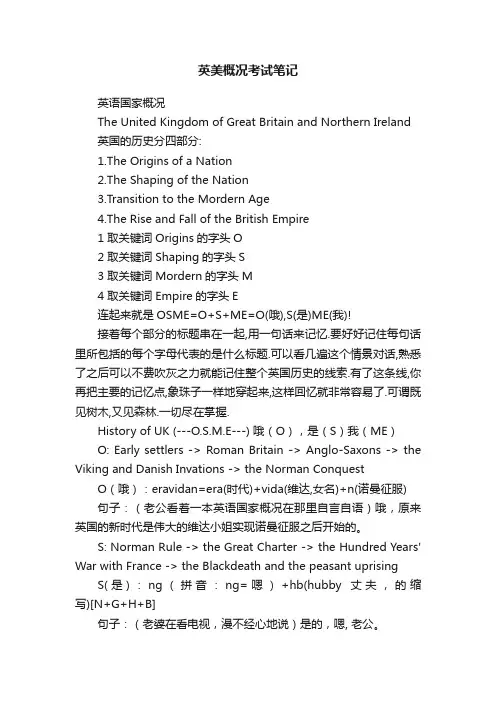
英美概况考试笔记英语国家概况The United Kingdom of Great Britain and Northern Ireland 英国的历史分四部分:1.The Origins of a Nation2.The Shaping of the Nation3.Transition to the Mordern Age4.The Rise and Fall of the British Empire1 取关键词Origins的字头O2 取关键词Shaping的字头S3 取关键词Mordern的字头M4 取关键词Empire的字头E连起来就是OSME=O+S+ME=O(哦),S(是)ME(我)!接着每个部分的标题串在一起,用一句话来记忆.要好好记住每句话里所包括的每个字母代表的是什么标题.可以看几遍这个情景对话,熟悉了之后可以不费吹灰之力就能记住整个英国历史的线索.有了这条线,你再把主要的记忆点,象珠子一样地穿起来,这样回忆就非常容易了.可谓既见树木,又见森林.一切尽在掌握.History of UK (---O.S.M.E---) 哦(O),是(S)我(ME)O: Early settlers -> Roman Britain -> Anglo-Saxons -> the Viking and Danish Invations -> the Norman Conquest O(哦):eravidan=era(时代)+vida(维达,女名)+n(诺曼征服)句子:(老公看着一本英语国家概况在那里自言自语)哦,原来英国的新时代是伟大的维达小姐实现诺曼征服之后开始的。
S: Norman Rule -> the Great Charter -> the Hundred Years' War with France -> the Blackdeath and the peasant uprising S(是):ng(拼音:ng=嗯)+hb(hubby丈夫,的缩写)[N+G+H+B]句子:(老婆在看电视,漫不经心地说)是的,嗯, 老公。
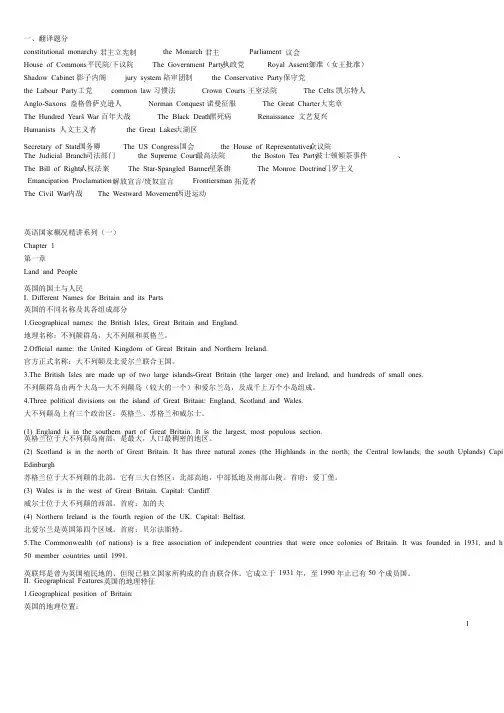
一、翻译题分constitutional monarchy 君主立宪制the Monarch 君主Parliament 议会House of Commons 平民院平民院/下议院The Government Party执政党Royal Assent御准(女王批准)Shadow Cabinet 影子内阁jury system 陪审团制the Conservative Party 保守党保守党the Labour Party 工党工党common law 习惯法Crown Courts 王室法院The Celts 凯尔特人Anglo-Saxons 盎格鲁萨克逊人Norman Conquest 诺曼征服The Great Charter 大宪章大宪章The Hundred Years’ War 百年大战The Black Death黑死病Renaissance 文艺复兴Humanists 人文主义者the Great Lakes大湖区Secretary of State国务卿The US Congress 国会众议院国会the House of Representatives众议院The Judicial Branch司法部门the Supreme Court最高法院最高法院the Boston Tea Party波士顿倾茶事件、The Bill of Rights人权法案人权法案The Star-Spangled Banner星条旗The Monroe Doctrine门罗主义Emancipation Proclamation解放宣言/废奴宣言Frontiersman拓荒者The Civil War内战The Westward Movement西进运动英语国家概况精讲系列(一)Chapter 1 第一章Land and People 英国的国土与人民I. Different Names for Britain and its Parts 英国的不同名称及其各组成部分1.Geographical names: the British Isles, Great Britain and England. 地理名称:不列颠群岛,大不列颠和英格兰。
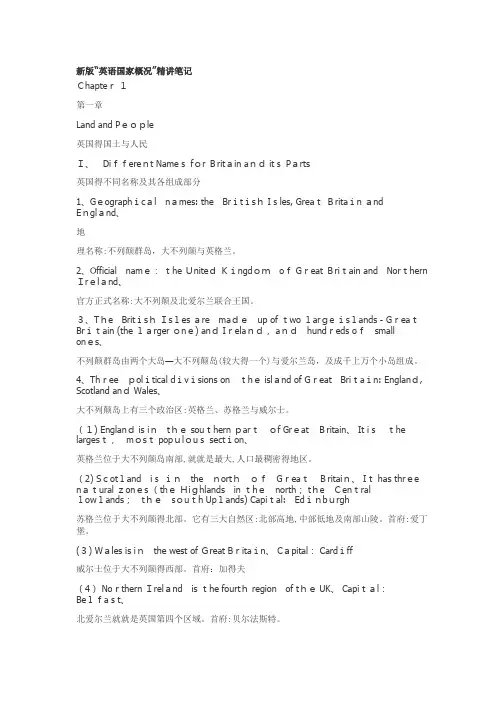
新版“英语国家概况”精讲笔记Chapter1第一章Land and People英国得国土与人民I、Different Names for Britain and its Parts英国得不同名称及其各组成部分1、Geographical names: the British Isles, GreatBritain andEngland、地理名称:不列颠群岛,大不列颠与英格兰。
2、Official name:the UnitedKingdomof Great Britain and Northern Ireland、官方正式名称:大不列颠及北爱尔兰联合王国。
3、The BritishIsles are madeup of two large islands-GreatBritain (the larger one) and Ireland, andhundreds ofsmallones、不列颠群岛由两个大岛—大不列颠岛(较大得一个)与爱尔兰岛,及成千上万个小岛组成。
4、Three political divisions on the island of Great Britain: England, Scotland and Wales、大不列颠岛上有三个政治区:英格兰、苏格兰与威尔士。
(1) England is inthe southern partof Great Britain、 It isthe largest,most populous section、英格兰位于大不列颠岛南部,就就是最大,人口最稠密得地区。
(2) Scotland isinthe northofGreatBritain、 It has three natural zones (theHighlands in thenorth; the Centrallowlands;thesouth Uplands) Capital: Edinburgh苏格兰位于大不列颠得北部。
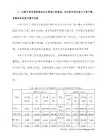
The UKUnit 11.The official name:The United Kingdom of Great Britain and Northern Ireland (Since 1927)national flag:The Union Flag OR popularly known as the Union Jacknational anthem(国歌):GOD SAVE THE QUEENnational capital of the country :London:Greater London大伦敦都市区: the City of London + 32 boroughs[ˈbʌrə](自治的市镇)The City of London伦敦城: at the center of the metropolitan-the financial center of thecountryInner London: the City of London + its 12 boroughsOuter London: 20 boroughs [ˈbʌrə](自治的市镇)surrounding Inner London2. The location and size of the country (了解)3. The terrain [təˈreɪn](地形), rivers and mountains of the countryRoughly two kinds of terrain---highland and lowland.The highland area --- in the northern part of the country, comprising the mountainousregions of Scotland, Northern Ireland, northern England and north Wales.The lowland area --- especially in the Midland, southern and eastern England.The longest river in the UK is River Severn(塞文河).Among the most important rivers is the Thames(泰晤士河), which is second longest but is the deepest river in the county.Ben Nevis(本·尼维斯)is the highest peak of the UK.(大不列颠境内的最高山峰,海拔1,343.8米,位于苏格兰西部的格兰扁山脉)Lough Neagh (396km2)(內伊湖): the largest lake in the whole country4. The natural resources of the countryCoal 煤●Britain has a rich deposit of coal with major coal mines in central and southwest of England.●For the last decades, there has been a steady decline in both coal production and number of coal mines.Petroleum [pəˈtrəuliəm] 石油●1965 saw discovery of big oil and oil fields under the North Sea, east of Britain.5. The climate of the countryTemperate maritime climate(温带海洋性气候)What are the characteristics of the climate in Great Britain?FoggyRainyUncertain and changeable6. Major citiesLondon ;Edinburgh [ˈednˌbɜ:rə] 爱丁堡;Cardiff [ˈkɑ:dɪf] 加地夫(威尔士的主要海港);Belfast [ˈbelˌfæst] 贝尔法斯特(北爱尔兰首府);Birmingham ['bɜ:mɪŋˌhæm] 伯明翰市(英国中部城市,第二大城市)Manchester: the Guardian(卫报)Glasgow:[ˈɡlɑ:sɡəu] 格拉斯哥(苏格兰最大城市,第三大城市)7. Population Density and Population Distribution⏹Population density: 248 persons per square kilometer.The Population of the UK is the 3rd largest in Europe.⏹Population distribution: high urbanization (7 conurbations)7 conurbations:Greater London大伦敦区, W. Midlands西密德兰都市郡, South Yorkshire 南约克都市郡, W. Yorkshire西约克郡都市郡, Greater Manchester大曼切斯特都市郡, Merseyside默西赛德都市郡(England), Tyne& Wear泰恩及威尔都市郡(Scotland) (了解)8. Nations and the Languages Spoken1) Nations: English, Scottish, Welsh and IrishEnglish (80%): descendants [dɪ'sendənts] 后裔of Anglo-SaxonsWelsh, Irish & Scottish::descendants of Celts2)Languages:A) English (official language):B) Gaelic [ˈgælɪk] 盖尔语: Scotland & Northern IrelandC) Welsh [welʃ] 威尔士语: Wales [weɪlz]3) T he history and development of the English language(p.7)⏹Old English (450AD-1100 AD) influenced by Old Norse (古斯堪的纳维亚语) spoken by Vikings (北欧海盗) and was closely related to the German and Dutch (荷兰) languages. The introduction of Christianity added the first wave of Latin and Greek words to the language and ended with the Norman Conquest.⏹Middle English (1100AD-1500AD) French replaced English as the official language in England. Numerous French words came into the English vocabulary and ended with the Black Death (黑死病).⏹Modern English (1500AD- present) Assimilating(吸收) words from Latin and Greek words throughout the Renaissance (文艺复兴) such as William Shakespeare and the King James Bible.⏹Standard English= the Queen’s Englis h= BBC English⏹Explanation of Standard EnglishStandard English is based on the speech of the upper class of the southeastern England.It is preferred by the educated andit is widely used in media and taught at schools. Is has developed and has been promoted as a model for the correct British English. It is also the norm(标准)carried overseas. Today, Standard English is codified to the extent that the grammar and vocabulary are much the same everywhere in the world where English is taught and used.9. Religion⏹ 1. Britain is a multi-faith society in which everyone has the right to religious freedom.⏹ 2. Christianity is the dominant religion of the country. Most of citizens are eitherProtestant ['prɒtɪstənt]新教徒or Catholic.⏹ 3. English nation: The church of England(英格兰圣公会)is the established church of theEnglish nation.⏹ 4. The major non-Christian communities in Britain are the Jews, the Moslems and theBuddhists.10. Character and manners of British people⏹Conservatism⏹Talking about the Weather⏹Punctuality11. Traditions and custom●Trooping the Color英国皇家军队阅兵仪式around the Bucking Place in London(P.62)to celebrate the Queen’s Birthday Parade. (The Changing Guard ceremony)●Religious FestivalsChristmas ( Three Christmas Traditions )①Christmas pantomime [ˈpæntəmaɪm] (童话剧)②Queen's Christmas message③Boxing Day(节礼日)Easter纪念耶稣复活Halloween12. MediaNewspaperTraditionally British newspapers have been divided into "quality", serious-minded newspapers (usually referred to as "broadsheets宽幅印刷品" because of their large size) and the more populist ['pɒpjəlɪst] 平民化, "tabloid" varieties.Quality Press: The Times(泰晤士报), The Guardian(卫报), The Daily Telegraph(每日电讯报)Tabloid [ˈtæblɔɪd] 通俗小报: The Sun on SundayTelevision and BroadcastBBC(the British Broadcasting Corporation), ITV(Independent Television) 英国独立电视台, BSkyB(the British Sky Broadcasting Group PLC)英国天空广播集团TV programs done well by the BBC (P.60)Unit 4. British Economy1. The Relative Decline of British Economy (Why?)⏹1) The country suffered a great loss in the two World Wars.⏹2) The era[ˈɪərə]时代of the British Empire was over.⏹3) Britain was still forced to maintain a substantial and expensive military presence.⏹4) Britain failed to invest in industry after WWII.₤However, the decline is not an absolute one. The UK is not poorer than before. In fact, it iswealthier and more productive than before. The only thing is that other countries develop faster than the UK. So, the UK has experienced a relative decline.2. Recent History of British Economy⏹1970 - high Inflation rate, strikes⏹1979 - Reformation Program(改革方案)by Thatcher government→去国有化privatization [ˌpraɪvətaɪ'zeɪʃn]⏹What was the content of the program?Thatcherism [ˈθætʃə(r)zəm] 撒切尔主义:Throughout the 1980s an extensive program of privatization was carried out.---Denationalization [ˌdi:ˌnæʃnəlaɪ'zeɪʃn] 非国有化①Government expenditure [ɪkˈspendɪtʃə(r)] 花费was reduced;②Taxation reformed;③Foreign exchange controls lifted外汇管制解除④Rules governing banks loosened;⑤Worker strikes restricted.⏹What was the long-term results?①Inflation(通货膨胀) has been controlled②Unemployment rate falling③Encouraged by low interest rates, investment has increased. It is second only to the US as a destination for international direct investment. It is also itself a major source of international investment --- it is the second biggest international investor in the world.⏹Policies of Blair Government & Results (P.45)Policies: ①Blair made the Bank of England independent.②In social policy, the Blair government changed the old Labor Party’s practice of usingtax system, public expenditure[ɪkˈspendɪtʃə(r)] 花费and price controls to reduce inequality and put an emphasis on the minimum wage and supplementing low incomes. It also emphasized individual responsibility.Results:①limit government spending②keep inflation under control③reduce unemploymentBy the end of the 20th century, British economic growth surpassed that of other major European countries.3. The Current British Economy⏹1) Primary Industries⏹AgricultureA. Features: small population, high mechanization[ˌmekənaɪ'zeɪʃn]机械化and highefficiency; but can not satisfy its domestic needsB. Chief agricultural products:wheat(小麦),barley [ˈbɑ:li]大麦,sugar beet(甜菜) and potatoes⏹Energy production (5% of national wealth).Main energy resources: coal (Rio Tinto Group力拓集团),oil (Shell 壳牌, British Petroleum and British Gas)⏹ 2) Secondary Industries:P .47⏹ 3) Tertiary Industries: 65% of national wealth1. (P .50)Foreign Trade ---- Lifeline. Britain is both an importer and exporter in the world.2. FinanceThe position of London in the world economyCentral Bank----Bank of EnglandThe Big Four: Lloyds 劳埃德, Barclays 巴克莱银行, Midland 米德兰,the National Westminster Bank Group 国民西敏寺银行3. Currency :Pound Sterling [paund ˈst ə:li ŋ] 英镑Unit 3 Political System1. Political System : Constitutional Monarchy [ ˌk ɔnst ɪˈtu:ʃən əl ˈm ɔn əki ] 君主立宪制What does it mean by Constitutional Monarchy?⏹ The King or Queen reigns [re ɪn]君主统治and is the head of the country, but dose notrule the country. The country is governed, in the name the Sovereign [ ˈs ɒvr ɪn ] 君主, but by His or Her Majesty ’s [ ˈmæd ʒəsti ]陛下government---- a body of ministers who are responsible to Parliament [ ˈp ɑ:ləm ənt ]议会.2. Parliament议会(最高立法机关)、立法 政府、行政部门 司法机关 [ d ʒuˈd ɪʃəri ]上议院 下议院 君主Parliament:⏹The UK is a unitary [ ˈju:nətri ]中央集权country.⏹The British Parliament is often referred to assupreme legislative authority(最高立法机关)of the UK.⏹The Main functions are making laws and supervising(监督)government and finance.⏹The life of Parliament is fixed at five years.Sovereign: Theoretically[ ˌθɪə'retɪklɪ ]理论上, the Queen has all the power. In reality, she does everything on the advice of the Prime Minister.The significance of the Queen? P.32It represents the continuity and adaptability of the whole political system and is a symbol of British unity, an indissoluble [ ˌɪndɪˈsɒljəbl ] (牢不可破的) bond among people who retain many regional and cultural difference.( 它代表了整个政治体系的连续性和适应性,是英国团结的象征,人们保留了许多地区和文化差异的不解之缘。
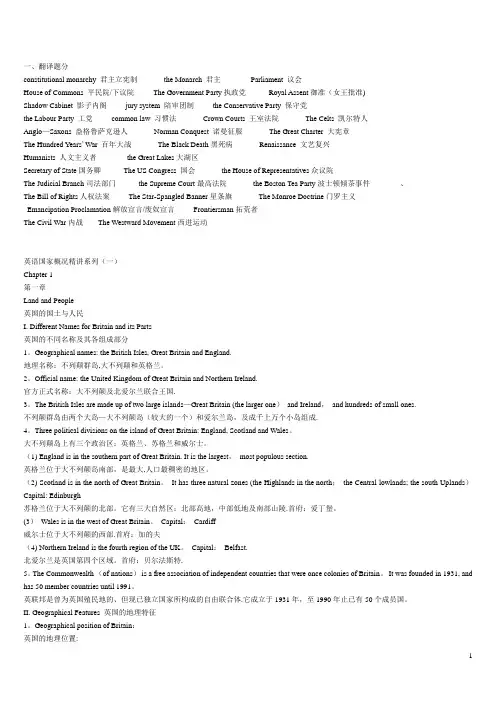
一、翻译题分constitutional monarchy 君主立宪制the Monarch 君主Parliament 议会House of Commons 平民院/下议院The Government Party执政党Royal Assent御准(女王批准)Shadow Cabinet 影子内阁jury system 陪审团制the Conservative Party 保守党the Labour Party 工党common law 习惯法Crown Courts 王室法院The Celts 凯尔特人Anglo—Saxons 盎格鲁萨克逊人Norman Conquest 诺曼征服The Great Charter 大宪章The Hundred Years’ War 百年大战The Black Death黑死病Renaissance 文艺复兴Humanists 人文主义者the Great Lakes大湖区Secretary of State国务卿The US Congress 国会the House of Representatives众议院The Judicial Branch司法部门the Supreme Court最高法院the Boston Tea Party波士顿倾茶事件、The Bill of Rights人权法案The Star-Spangled Banner星条旗The Monroe Doctrine门罗主义Emancipation Proclamation解放宣言/废奴宣言Frontiersman拓荒者The Civil War内战The Westward Movement西进运动英语国家概况精讲系列(一)Chapter 1第一章Land and People英国的国土与人民I. Different Names for Britain and its Parts英国的不同名称及其各组成部分1。

英语国家概况复习笔记 Final approval draft on November 22, 2020英语国家概况复习笔记Chapter1LandandPeople英国的国土与人民DifferentNamesforBritainanditsParts英国的不同名称及其各组成部分1.Geographicalnames:theBritishIsles,GreatBritainandEngland.地理名称:不列颠群岛,大不列颠和英格兰.2.Officialname:theUnitedKingdomofGreatBritainandNorthernIreland.官方正式名称:大不列颠及北爱尔兰联合王国.3.TheBritishIslesare madeupof twolargeislands—GreatBritain(thelargerone)and Ireland,and hundredsofsmallones.不列颠群岛由两个大岛[大不列颠岛(较大的一个)和爱尔兰岛]及成千上万个小岛组成.4.Three politicaldivisions ontheislandofGreatBritain:England,Scotland and Wales.大不列颠岛上有三个政区:英格兰,苏格兰和威尔士.①EnglandisinthesouthernpartofGreatBritain.Itisthelargest,mostpopuloussection.位于大不列颠岛南部,是最大,人口最稠密的地区.②ScotlandisinthenorthofGreatBritain.Ithasthreenat uralzones(theHighlandsinthenorth;theCentrallowlands;t hesouthUplands)Capital:Edinburgh.苏格兰位于大不列颠的北部.它有三大自然区:北部高地,中部低地及南部山陵.首府:爱丁堡.③WalesisinthewestofGreatBritain.Capital:Cardiff威尔士位于大不列颠的西部.首府:加的夫④NorthernIrelandisthefourthregionoftheUK.Capital:Belfast.北爱尔兰是英国第四个区域.首府:贝尔法斯特5.The Commonwealth(ofnations)isafreeassociationofindependentcountriesthatwereoncecoloniesofBritain.Membe rnationsarejoinedtogethereconomicallyandhavecertaintradingagreements.TheCommonwealthhasnospecialpowers. ThedecisiontobecomeamemberoftheCommonwealthislefttoeachnation.Itwasfoundedin1931,andhas50membercountrie suntil1991.英联邦是一个自由联合体,由曾是英国殖民地而现在已经独立的国家构成.成员国之间实行经济合作,有一定的贸易协议.英联邦没有特别的权利,是否参加英联邦由各成员国自己决定.它成立于1931年,到1991年止已有50个成员国.Chapter2TheOriginsofaNation(5000BC-1066)英国的起源1.ArrivalandsettlementoftheCelts Atabout700BC theCeltsbegantoarriveinBritainandkeptcomingun tilthearrivaloftheRomans.TheymaycomeoriginallyfromeasternandcentralEurope,now France,Belgium and southernG ermany.约公元前700年,凯尔特人来到不列颠岛并一直陆续到来直到罗马人的入侵.他们可能源自东欧和中欧,即现在的法国,比利时和德国南部.Theycameinthreemainwaves:the Gaels~about600BC;the Brythons~about400BC;the Belgae~about150BC.凯尔特人来到不列颠有三次高潮:第一次是约公元前600年的盖尔人;第二次是约公元前400年的布立吞人;第三次是约公元前150年的贝尔盖人.TheCeltictribesaretheancestorsofthe HighlandScots,the Irish andthe Welsh,andtheirlanguagesarethebasisofb oth Welsh and Gaelic.凯尔特人是山地苏格兰人,爱尔兰人和威尔士人的祖先,他们的语言是威尔士语和盖尔语的基础.TheCelts’religionwas Druidism.凯尔特人的宗教为德鲁伊德教.The Belgae werethemost industrious and vigorous oftheCeltictribes.贝尔盖人是最勤奋,最精力充沛的.TheCeltswere practisedfarmers.凯尔特人是有经验的农民.2.BasisofmodernEnglishrace:theAnglo-Saxons现代英国人的基础:盎格鲁—萨克逊(446-871)Inthemid-5th century Jutes,Saxons,and Angles cametoBritain.Theywerethree Teutonic tribes.TheJutes,whofishedandfarmedinJ utland(now southernDenmark),cametoBritainfirst.ThentheSaxonscame.Theycamefrom northernGermany,established theirkingdomsin Essex,Sussex and Wessex.Inthesecondhalfofthe6th century,the Angles whoalsocamefromnorthernGerm anyandwereto givetheirnametotheEnglishpeople,settledin EastAnglia,Mercia and Northumbria.五世纪中叶,朱特人,撒克逊人和盎格鲁人来到不列颠岛.这是三支日耳曼部落.居住在朱特兰岛(现丹麦南部)从事打渔农耕的朱特人先到达不列颠;接着是撒克逊人,他们来自德国北部,在埃塞克斯,苏塞克斯和威塞克斯建立了王国;六世纪后半叶,同样来自德国北部把自己名字给了英国人的盎格鲁人,在东盎格利亚,麦西亚以及诺森伯利来定居.Heptarchy:DuringtheAnglo-Saxon’stime,Britainwasdividedintomanykin gdoms,amongwhichthereweresevenprincipalkingdomsofKent,Essex,Su ssex,Wessex,EastAnglia,MerciaandNorthumbria.TheyweregiventhenameforHeptarchy.在盎格鲁-撒克逊时期,英国被划分为许多王国,其中有七个主要王国:肯特,埃塞克斯,苏塞克斯,威塞克斯,东盎格利亚,麦西亚和诺森伯利来.他们被合称为七王国.TheAnglo-Saxontribeswere constantlyatwarwithoneanother,eachtryingtogettheupperhand,sothatthekingdomswereoftenbrok enupandoftenpiecedtogetheragain.盎格鲁-撒克逊部落之间不断交战,彼此都想占上风,因此王国总是分了合,合了又分TheAnglo-Saxons broughttheirownTeutonicreligiontoBritain.盎格鲁—撒克逊人把日耳曼宗教带到了英国.AlthoughtheAnglo-Saxonswere ferocious people,theylaidthe foundations oftheEnglishstate.Firstly,theydividedthecountryinto shir es;Secondly,theydevisedthe narrow-strip,three-fieldfarmingsystem whichcontinuedtothe18thcentury;Thirdly,theyalsoestablishedthe manorial system.Finally,t heycreatedthe Witan(council/meetingofwisemen)toadvisetheking,thebasisofthePrivyCouncilwhichstillexiststo day.虽然盎格鲁-撒克逊人是凶猛的民族,但他们为英国国家的形成打下了基础.首先他们把国家划分为郡;其次他们设计的窄条三圃田农耕制延用至18世纪;他们还建立了采邑制;最后他们还创立了议会(贤人会议),向国王提供建议,这是现存的枢密院的基础.3.TheVikingandDanishinvasions The NorwegianVikings andthe Danes attackedvariouspartsofEnglandfr omtheendofthe8th century.TheDanesgainedcontrolofthenorthandeastofEngland—the Danelaw.从8世纪末起,挪威海盗和丹麦人就不断袭击英格兰各地方.丹麦人控制英格兰北部和东部丹麦法区.AfterAlfred’sdeath,hissuccessorsreconqueredtheDanelaw.KingEthelredtheUnreadytriedpayingtheinvaderst ostayaway.ButtheDanesdidn’t goawaybutinvadeagain.亚尔弗雷德死后,他的继任者们重新征服了丹麦地区."未准备好者"埃塞尔雷德国王进贡给丹麦人以免被侵略,但丹麦人又再度进犯.AfterEthelred’sdeath,Canute,theDanishleaderwasmadeEnglishkingin1016.Heprovedtobeawiseruler.Afterhis deathin1035,hissons Harold and Hardicanute reignedsuccessively.AfterHardicanute’sdeaththesuccessionpassedt othesuccessor EdwardtheConfessor.埃塞尔雷德死后,丹麦首领喀奴特在1016年成为了英国国王.他是位英明的通知者.1035年他死后,他的儿子哈罗德和哈迪喀奴特先后统治王国.哈迪喀奴特死后,王位传给了"忏悔者"爱德华.4.KingAlfredandhiscontributions亚尔弗雷德国王和他所做出的贡献(849-899)①Alfredwasthe kingofWessex anddefeatedtheDanesandreachedafriendlyagreementwiththemin879亚尔弗雷德是威塞克斯的国王.他打败了丹麦人,并于公元879年与他们达成了友好协议;②Hefoundedastrong fleet andisknownas“thefatheroftheBritishnavy”他因为建立了强大舰队,而以“英国海军之父”闻名于世;③He reorganized the Saxonarmy,makingitmoreefficient他改组了撒克逊军队,使之更为高效;④Heissaidtohavetaughthims elf Latin and translated aLatinbookintoEnglish据说他自学了拉丁语并将一本拉丁语书译成英语⑤Heencouragedlearninginothers,establishedschools andformulateda legalsystem.Allthisearnshimthetitle“Alf redtheGreat”他鼓励向他人求知并修建学校,并且制订法律制度.5.TheNormanConquestanditsconsequences诺曼征服及其影响(1066)ItwassaidthatkingEdwardhadpromisedtheEnglishthronetoWilliam,buttheWitanchoseHaroldasking.So Willia m ledhisarmytoinvadeEngland.InOctober1066,William defeatedHarold inthe battleofHastings.OnChristmasDayWilli amwascrownedkingofEnglandin WestminsterAbbey.据说爱德华国王曾答应把英格兰王位传给诺曼底公爵威廉,但是贤人会议挑选了哈罗德为国王.公元1066年10月,在哈斯丁斯战役中威廉打败了哈罗德军队.圣诞节这天在威斯敏斯特大教堂,威廉被加冕为英格兰国王.TheNormanConquestof1066isperhapsthebest-knowneventinEnglishhistory.WilliamtheConquerorconfiscatedalmostallthelandandgaveittohisNormanfollowers. HereplacedtheweakSaxonrulewithastrongNormangovernment.TheNormanConquestendedtheEnglishhistoryofbeinginv aded,the feudalsystem wascompletelyestablishedinEngland.RelationswiththeContinentwereopened,andcivilizati onandcommercewereextended.Norman-Frenchculture,language,mannersandarchitecturewereintroduced.TheChurchwasbroughtintocloserconnectionwith Rome,andthechurchcourtswereseparatedfromthecivilcourts.公元1066年的诺曼征服也许是英国历史上的最着名事件.征服者威廉没收了几乎所有土地,将其分发给他的诺曼追随者.他用强大的诺曼政府取代软弱的撒克逊人统治.诺曼征服结束了被侵略的英国历史,英格兰完全确立了封建制度:扩展了与欧洲大陆的关系;文明和商业都得到发展;引进了诺曼—法国文化、语言、举止和建筑.教会与罗马的联系更为密切,教会法庭从世俗法庭中单独分离出来.Chapter3TheShapingoftheNation英国的形成(公元1066-1381)1.England'sfeudalismundertheruleofWilliamtheConqueror在威廉统治下的英国封建制度①Under William,thefeudalsysteminEnglandwascompletelyestablished在威廉统治下,英国的封建制度得到完全确立;②Inthissystem,theKingownedallthelandpersonally根据此制度,国王拥有全国所有土地;③WilliamgavehisbaronslargeestatesinEnglandinreturnforapromiseofmilitaryserviceandaproportionoftheland’s produce威廉把英国的大片土地分给贵族,条件是贵族保证服役和交租;④Theseestateswerescatteredfarandwideoverthecountry,sothatthosewhoheldthemcouldnoteasilycombinetorebelthe king贵族的这些地产分散于各处,这样土地拥有者就不易联合起来反叛国王;⑤Thebaronsparceledouthislandtothelessernobles,knightsandfreemen,alsoinreturnforgoodsandservices贵族又把土地分配给小贵族,骑士和自由民,同样要他们交租和服役;⑥Atthe bottom ofthefeudalscalewerethe villeins or serfs 在封建等级底层的是农奴;⑦OnepeculiarfeatureofthefeudalsystemofEnglandwasthatalllandownersmusttaketheoathofallegiance,notonlytoth eirimmediatelord,butalsototheking英国封建制独有的特色就是,无论是土地承租人还是二佃户,都必须要宣誓效忠于直接领主,而且要效忠于国王.William replaced the Witan withthe GrandCouncil.威廉用大议会取代了贤人会议.Inordertohaveareliablerecordofallhislands,histenantsandtheirpossessions,Williamsenthisclerkstocompil eapropertyrecordknownasDomesdayBook,whichwascompletedin1086.为了使所有的土地,佃户和他们的财产记录可靠,威廉派官员编了一本财产清册,称为末日审判书2.ContentsandthesignificanceoftheGreatCharter大宪章的内容及意义AlsoknownastheMagnaCarta,GreatCharterwassignedby KingJohn in1215underthepressofthebarons.大宪章是约翰国王1215年在封建贵族压力下签定的.Itconsistsof63clauses.Itsimportantprovisionsareasfollows大宪章共有63条:①notaxshouldbemadewithouttheapprovaloftheGrandCouncil没有大议会批准不得征税;②nofreemanshouldbearrested,imprisoned,ordeprivedofhispropertyexceptbythelawoftheland除依照法律,不得随意逮捕,拘禁自由民,不依照土地法不得剥夺其财产;③theChurchshouldpossessallitsrights,togetherwithfreedomofelections教会拥有的权利和选举自由不受侵犯;④Londonandothertownsshouldretaintheirancientrightsandprivileges伦敦和其它城市应保留其古老的权利和特权;⑤thereshouldbethesameweightandmeasuresthroughoutthecountry全国应统一度量衡.AlthoughtheGreatCharterhaslongbeenpopularlyregardedas thefoundationofEnglishliberties,itwasastatement ofthefeudalandlegalrelationshipbetweentheCrownandthebarons,aguaranteeofthefreedomoftheChurchanda limitat ionofthepowersoftheking.The spirit oftheGreatCharterwasthelimitationofthepowersoftheking,keepingthemwithi ntheboundsofthefeudallawoftheland.尽管长期普遍认为大宪章是英国自由的基础,但它只是国王与贵族之间的封建与法律关系,保证教会的自由,限制国王的权力.大宪章的精神是限制王权,置王权于封建法律的约束下.3.TheoriginsoftheEnglishParliament英国议会的起源In1258,thebarons,under SimondeMontfort,forcedHenryⅢandhissonPrinceEdwardtosweartoacceptthe ter,HenryrefusedtoconfirmtotheProvisionsofO xford,thusacivilwarbrakeoutbetweentheking’ssupportersandthebaronialarmyledby SimondeMontfort.1258年,贵族们在西蒙德孟福尔的领导下迫使国王和他的儿子爱德华王子宣誓接受"牛津协定".亨利拒绝批准牛津协定,国王的支持者和西蒙德孟福尔领导的封建主组成的军队之间爆发了内战.TheGreatCouncilisknowntobetheprototypeofthecurrentBritishParliament.In1265,SimondeMontfortsummonedthe GreatCouncil,togetherwith twoknightsfromeachcountry and twocitizensfromeachtown.,ameetingwhichhasseenasthe earliestparliament.ItlaterdevelopedintotheHouseofLordsandtheHouseofCommonasaparliament.大议会是当今英国议会的原型.1265年,西门德孟福尔召开大议会,各县有两名骑士,各镇有两名市民参加,此次会议被看作是最早的议会.大议会发展到后来演变成议会.分为上议院和下议院Itsmainrolewastoofferadvice,nottomakedecisions.Therewerestillnoelections,noparties,andthemostimportantp artofParliamentwastheHouseofLords.其作用是咨询而非决定,也没有选举和政党.议会的最重要的部分是上议院4.TheHundredYears'WarwithFranceanditsconsequences百年战争及其结果WhenEdwardIIIclaimedtheFrenchCrownbuttheFrenchrefusedtorecognize,thewarbrokeout.爱德华三世宣布要继承法国王位,但法国人民拒绝承认,于是引发了百年战争.TheHundredYears’WarwithFrancereferstothewarbetweenEnglandandFrancethatlasted intermittentlyfrom1337t o1453.Thecausesofthewarwerepartlyterritorialandpartlyeconomic.Theterritorialcauseswererelatedwiththepos sessionbytheEnglishkingsofthelargeduchyofAquitaine,whiletheFrenchkingscovetedthislargeslice.Theeconomic causeswereconnectedwithclothmanufacturingtownsinFlanders,whichweretheimporterofEnglishwool,buttheywerel oyaltotheFrenchkingpolitically.Besides,England'sdesiretostopFrancefromgivingaidtoScotsandagrowingsenseo fnationalismweretheothercauses.百年战争指1337年到1453年英法之间一场断断续续的战争.战争的起因既有领土因素又有经济因素.领土起因尤其是与英国国王拥有法国阿奎丹大片的公爵领地有密切关系,随着法国国王势力日增,他们日益渴望占领这片从他们领土内被分割出去的土地.经济原因则与弗兰德斯有关.弗兰德斯地区生产棉布的城镇是英国羊毛的主要进口地,但这些城镇在政治上却效忠法国国王.其他原因还有英国试图阻止法国帮助苏格兰人,以及不断觉醒的民族意识.Whenthewarended,Calais wastheonlypartofFrancethatstillinthehandsofEnglish.战争结束的时候只有加来港还被英军占领.Consequences:TheexpulsionoftheEnglishfromFranceisregardedasablessingforbothcountries:hadtheyremained ,thesuperiorsizeandwealthofFrancewouldcertainlyhavehinderedthedevelopmentofaseparateEnglishnationaliden tity,whileFrancewashinderedsolongasaforeignpoweroccupiedsomuchFrenchterritory.战争的结果:把英国人赶出了法国对两个国家都是幸事:若英国人继续留在法国,那么法国人在领土和财富上所占的优势必然会阻碍英国作为一个独立民族的发展;而法国如被外国势力占领了大量的领土,其民族特性的发展也要长期受阻.HenryⅤrenewedthewarin1415andwonacrushingvictoryat Argencourt.HewasrecognizedtotheFrenchthronein1420.Afterhisde ath,theFrench,encouragedby JoanofArc,finallydrovetheEnglishoutofFrance.亨利五世在1415年重新发动战争.在阿根科特战役中大胜.他在1420年成为法国国王.亨利死后,法国人民在圣女贞德的鼓舞下,最终把英军驱逐出法国. 5.ConsequencesoftheBlackDeath黑死病的影响TheBlackDeathwasthemodernnamegiventothedeadlyepidemicdiseasespreadbyratfleasacrossEurope inthe14th century .ItsweptthroughEnglandinthesummerof1348withoutwarningand,mostimportantly,withoutanycure.ItreducedEnglan d’spopulation from fourmilliontotwomillion(aboutonehalfandonethirdofthepopulation waskilled)bytheendofthe 14th century.黑死病是现代名称,指老鼠身上的跳蚤传播的致命的淋巴腺鼠疫引起的传染性疾病.14世纪传播了到欧洲.1348年夏天横扫全英国,事先毫无预兆,而更重要的是无药可救.英国的人口在14世纪末从400万锐减至200万.TheeconomicconsequencesoftheBlackDeathwerefar-reaching.Asaresultoftheplague,ndownersten dedtochangefromarabletosheep-farming,whichrequiredlesslabour.Thesurvivingpeasantshadbetterbargainningpowerandwereinapositiontochange theirserfdomintopaidlabour.Sosomelandlords,unableorunwillingtopayhigherwages,triedtoforcepeasantsbackin toserfdom.In1351thegovernmentissuedaStatuteofLabourerswhichmadeitacrimeforpeasantstoaskformorewagesorfo rtheiremployerstopaymorethantherateslaiddownbytheJusticesofthePeace.黑死病对经济造成的后果更为深远.鼠疫导致了大片土地无人照管和劳动力极度匮乏.地主只得把耕地改成对人力需求较少的牧场.幸存的农民处于有利的可以讨价还价的地位,他们从农奴变为雇佣劳动力。
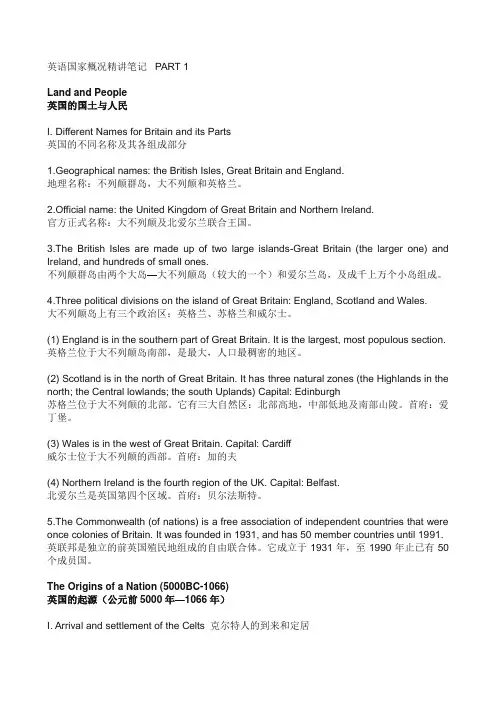
英语国家概况精讲笔记PART 1Land and People英国的国土与人民I. Different Names for Britain and its Parts英国的不同名称及其各组成部分1.Geographical names: the British Isles, Great Britain and England.地理名称:不列颠群岛,大不列颠和英格兰。
2.Official name: the United Kingdom of Great Britain and Northern Ireland.官方正式名称:大不列颠及北爱尔兰联合王国。
3.The British Isles are made up of two large islands-Great Britain (the larger one) and Ireland, and hundreds of small ones.不列颠群岛由两个大岛—大不列颠岛(较大的一个)和爱尔兰岛,及成千上万个小岛组成。
4.Three political divisions on the island of Great Britain: England, Scotland and Wales.大不列颠岛上有三个政治区:英格兰、苏格兰和威尔士。
(1) England is in the southern part of Great Britain. It is the largest, most populous section. 英格兰位于大不列颠岛南部,是最大,人口最稠密的地区。
(2) Scotland is in the north of Great Britain. It has three natural zones (the Highlands in the north; the Central lowlands; the south Uplands) Capital: Edinburgh苏格兰位于大不列颠的北部。
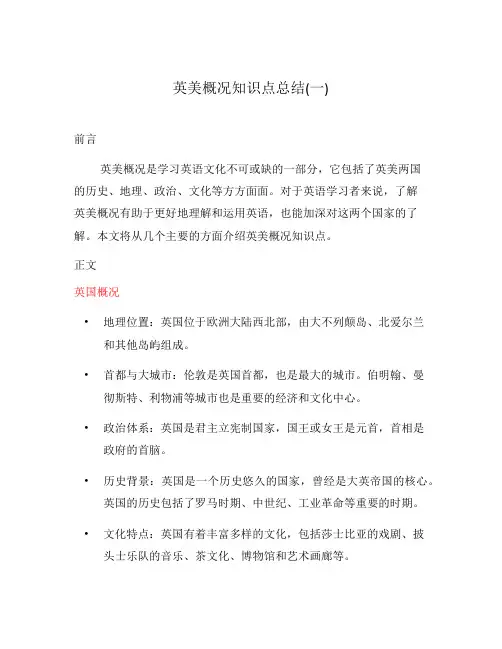
英美概况知识点总结(一)前言英美概况是学习英语文化不可或缺的一部分,它包括了英美两国的历史、地理、政治、文化等方方面面。
对于英语学习者来说,了解英美概况有助于更好地理解和运用英语,也能加深对这两个国家的了解。
本文将从几个主要的方面介绍英美概况知识点。
正文英国概况•地理位置:英国位于欧洲大陆西北部,由大不列颠岛、北爱尔兰和其他岛屿组成。
•首都与大城市:伦敦是英国首都,也是最大的城市。
伯明翰、曼彻斯特、利物浦等城市也是重要的经济和文化中心。
•政治体系:英国是君主立宪制国家,国王或女王是元首,首相是政府的首脑。
•历史背景:英国是一个历史悠久的国家,曾经是大英帝国的核心。
英国的历史包括了罗马时期、中世纪、工业革命等重要的时期。
•文化特点:英国有着丰富多样的文化,包括莎士比亚的戏剧、披头士乐队的音乐、茶文化、博物馆和艺术画廊等。
美国概况•地理位置:美国位于北美洲,从东海岸到西海岸横跨了大陆。
•首都与大城市:华盛顿特区是美国首都,纽约、洛杉矶、芝加哥等城市是美国的重要城市。
•政治体系:美国是联邦共和制国家,总统是最高行政和国家元首,国会是立法机构。
•历史背景:美国是一个年轻的国家,从独立战争开始建立起来。
美国历史包括了西部拓荒、内战、种族平等运动等重要的事件。
•文化特点:美国文化多样,融合了来自世界各地的移民文化。
美国文化的代表包括好莱坞电影、音乐、篮球和美式足球等。
结尾通过了解英美概况,我们可以更好地理解和运用英语,也可以深入了解英美两国的历史和文化。
英国和美国虽然有相似之处,但也有自己独特的特点。
希望本文所提供的英美概况知识点对于英语学习者有所帮助。
前言英美概况是学习英语文化不可或缺的一部分,它包括了英美两国的历史、地理、政治、文化等方方面面。
对于英语学习者来说,了解英美概况有助于更好地理解和运用英语,也能加深对这两个国家的了解。
本文将从几个主要的方面介绍英美概况知识点。
正文英国概况•地理位置:英国位于欧洲大陆西北部,由大不列颠岛、北爱尔兰和其他岛屿组成。

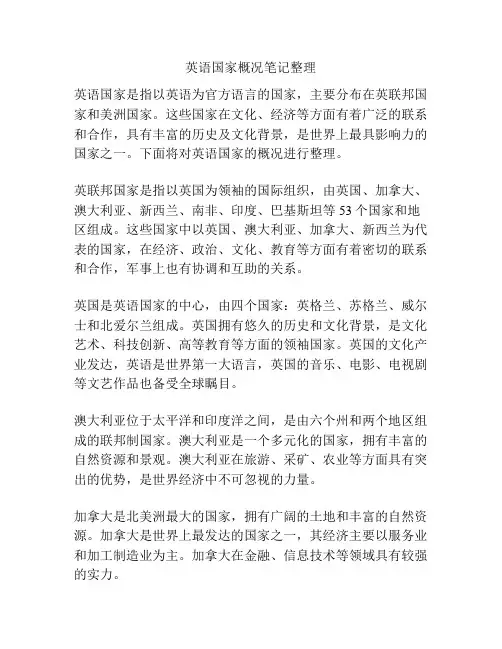
英语国家概况笔记整理英语国家是指以英语为官方语言的国家,主要分布在英联邦国家和美洲国家。
这些国家在文化、经济等方面有着广泛的联系和合作,具有丰富的历史及文化背景,是世界上最具影响力的国家之一。
下面将对英语国家的概况进行整理。
英联邦国家是指以英国为领袖的国际组织,由英国、加拿大、澳大利亚、新西兰、南非、印度、巴基斯坦等53个国家和地区组成。
这些国家中以英国、澳大利亚、加拿大、新西兰为代表的国家,在经济、政治、文化、教育等方面有着密切的联系和合作,军事上也有协调和互助的关系。
英国是英语国家的中心,由四个国家:英格兰、苏格兰、威尔士和北爱尔兰组成。
英国拥有悠久的历史和文化背景,是文化艺术、科技创新、高等教育等方面的领袖国家。
英国的文化产业发达,英语是世界第一大语言,英国的音乐、电影、电视剧等文艺作品也备受全球瞩目。
澳大利亚位于太平洋和印度洋之间,是由六个州和两个地区组成的联邦制国家。
澳大利亚是一个多元化的国家,拥有丰富的自然资源和景观。
澳大利亚在旅游、采矿、农业等方面具有突出的优势,是世界经济中不可忽视的力量。
加拿大是北美洲最大的国家,拥有广阔的土地和丰富的自然资源。
加拿大是世界上最发达的国家之一,其经济主要以服务业和加工制造业为主。
加拿大在金融、信息技术等领域具有较强的实力。
新西兰是一个位于南太平洋的岛国,由北岛和南岛以及其他一些小岛组成。
新西兰优美的自然环境使其成为了世界上著名的旅游胜地,同时其在农业、林业、渔业等领域也有着不俗的表现。
美洲国家是指以英语为官方语言的南、北美洲国家,包括美国、加拿大和13个加勒比国家。
这些国家在经济、政治、文化等方面也有着紧密的联系和合作。
美国是世界经济最大的国家之一,是世界级的大国和超级大国。
美国拥有强大的军事实力和文化影响力,同时也在国际事务中发挥着重要作用。
美国是全球科技、金融和文化中心之一,其在电影、音乐、时尚、饮食等方面也有着巨大的影响力。
加勒比国家是指坐落在加勒比海与墨西哥湾之间的一批岛国,其中比较著名的包括牙买加、海地、巴哈马等。
英语国家概况学习笔记---1英语国家概况学习笔记Land and PeopleGreat Britain is the largest island in Europe .It is made up of England , Scotland ,and Wales .Together with Northern Ireland ,It forms the United Kingdom of Great Britain and Northern Ireland. This is the full name of the country which constitutes all these places .The United Kingdom of Great Britain and Northern Ireland, or the United Kingdom , is “the UK ”for short. However, most people cal l the UK ”Britain”or ”Great Britain ”,and some people simply say “England” ,which is incorrect and particularly annoys the Scots.Great Britain是欧洲最大的岛屿,由英国,苏格兰和威尔士组成。
与北爱尔兰一起,它构成了大不列颠及北爱尔兰联合王国。
这是这些所有这些地方的国家的全称。
The United Kingdom of Great Britain and Northern Ireland或United Kingdom或是简称“the UK”。
然而,大多数人称The UK 为“Britain”或“Great Britain”,还有些人只是说“England”,这是错误的,特别使苏格兰人的烦恼。
According to the 2011 census, the total population of the UK was around 63million.It is the third –largest in the European Union (behind Germany and France ) and the 22nd-largest in the word.根据2011年人口普查,英国总人口约为6300万人,是欧盟第三大(落后于德国和法国),排在第二十二位。
英语国家概况复习笔记TheUKThe UKUnit 11.The official name:The United Kingdom of Great Britain and Northern Ireland (Since 1927)national flag:The Union Flag OR popularly known as the Union Jacknational anthem(国歌):GOD SAVE THE QUEENnational capital of the country :London:Greater London⼤伦敦都市区: the City of London + 32 boroughs[?b?r?](⾃治的市镇)The City of London伦敦城: at the center of the metropolitan-the financial center of thecountryInner London: the City of London + its 12 boroughsOuter London: 20 boroughs [?b?r?](⾃治的市镇)surrounding Inner London2. The location and size of the country (了解)3. The terrain [t??re?n](地形), rivers and mountains of the countryRoughly two kinds of terrain---highland and lowland.The highland area --- in the northern part of the country, comprising the mountainousregions of Scotland, Northern Ireland, northern England and north Wales.The lowland area --- especially in the Midland, southern and eastern England.The longest river in the UK is River Severn(塞⽂河).Among the most important rivers is the Thames(泰晤⼠河), which is second longest but is the deepest river in the county. Ben Nevis(本·尼维斯)is the highest peak of the UK.(⼤不列颠境内的最⾼⼭峰,海拔1,343.8⽶,位于苏格兰西部的格兰扁⼭脉)Lough Neagh (396km2)(內伊湖): the largest lake in the whole country4. The natural resources of the countryCoal 煤●Britain has a rich deposit of coal with major coal mines in central and southwest of England.●For the last decades, there has been a steady decline in both coal production and number of coal mines.Petroleum [p??tr?uli?m] ⽯油●1965 saw discovery of big oil and oil fields under the North Sea, east of Britain.5. The climate of the countryTemperate maritime climate(温带海洋性⽓候)What are the characteristics of the climate in Great Britain?FoggyRainyUncertain and changeable6. Major citiesLondon ;Edinburgh [?edn?b?:r?] 爱丁堡;Cardiff [?kɑ:d?f] 加地夫(威尔⼠的主要海港);Belfast [?bel?f?st] 贝尔法斯特(北爱尔兰⾸府);Birmingham ['b?:mh?m] 伯明翰市(英国中部城市,第⼆⼤城市)Manchester: the Guardian(卫报)Glasgow:[?ɡlɑ:sɡ?u] 格拉斯哥(苏格兰最⼤城市,第三⼤城市)7. Population Density and Population DistributionPopulation density: 248 persons per square kilometer.The Population of the UK is the 3rd largest in Europe.Population distribution: high urbanization (7 conurbations)7 conurbations:Greater London⼤伦敦区, W. Midlands西密德兰都市郡, South Yorkshire 南约克都市郡, W. Yorkshire西约克郡都市郡, Greater Manchester⼤曼切斯特都市郡, Merseyside默西赛德都市郡(England), Tyne& Wear泰恩及威尔都市郡(Scotland) (了解)8. Nations and the Languages Spoken1) Nations: English, Scottish, Welsh and IrishEnglish (80%): descendants [d?'send?nts] 后裔of Anglo-SaxonsWelsh, Irish & Scottish::descendants of Celts2)Languages:A) English (official language):B) Gaelic [?g?l?k] 盖尔语: Scotland & Northern IrelandC) Welsh [wel?] 威尔⼠语: Wales [we?lz]3) T he history and development of the English language(p.7)Old English (450AD-1100 AD) influenced by Old Norse (古斯堪的纳维亚语) spoken by Vikings (北欧海盗) and was closely related to the German and Dutch (荷兰) languages. The introduction of Christianity added the first wave of Latin and Greek words to the language and ended with the Norman Conquest.Middle English (1100AD-1500AD) French replaced English as the official language in England. Numerous French words came into the English vocabulary and ended with the Black Death (⿊死病).Modern English (1500AD- present) Assimilating(吸收) words from Latin and Greek words throughout the Renaissance (⽂艺复兴) such as William Shakespeare and the King James Bible.Standard English= the Queen’s Englis h= BBC EnglishExplanation of Standard EnglishStandard English is based on the speech of the upper class of the southeastern England.It is preferred by the educated andit is widely used in media and taught at schools. Is has developed and has been promoted as a model for the correct British English. It is also the norm(标准)carried overseas. Today, Standard English is codified to the extent that the grammar and vocabulary are much the same everywhere in the world where English is taught and used.9. Religion1. Britain is a multi-faith society in which everyone has the right to religious freedom.2. Christianity is the dominant religion of the country. Most of citizens are eitherProtestant ['pr?t?st?nt]新教徒or Catholic.3. English nation: The church of England(英格兰圣公会)is the established church of theEnglish nation.4. The major non-Christian communities in Britain are the Jews, the Moslems and theBuddhists.10. Character and manners of British peopleConservatismTalking about the WeatherPunctuality11. Traditions and custom●Trooping the Color英国皇家军队阅兵仪式around the Bucking Place in London(P.62)to celebrate the Queen’s Birthday Parade. (The Changing Guard ceremony)●Religious FestivalsChristmas ( Three Christmas Traditions )①Christmas pantomime [?p?nt?ma?m] (童话剧)②Queen's Christmas message③Boxing Day(节礼⽇)Easter纪念耶稣复活Halloween12. MediaNewspaperTraditionally British newspapers have been divided into "quality", serious-minded newspapers (usually referred to as "broadsheets宽幅印刷品" because of their large size) and the more populist ['p?pj?l?st] 平民化, "tabloid" varieties.Quality Press: The Times(泰晤⼠报), The Guardian(卫报), The Daily Telegraph(每⽇电讯报)Tabloid [?t?bl??d] 通俗⼩报: The Sun on SundayTelevision and BroadcastBBC(the British Broadcasting Corporation), ITV(Independent Television) 英国独⽴电视台, BSkyB(the British Sky Broadcasting Group PLC)英国天空⼴播集团TV programs done well by the BBC (P.60)Unit 4. British Economy1. The Relative Decline of British Economy (Why?)1) The country suffered a great loss in the two World Wars.2) The era[r]时代of the British Empire was over.3) Britain was still forced to maintain a substantial and expensive military presence.4) Britain failed to invest in industry after WWII.However, the decline is not an absolute one. The UK is not poorer than before. In fact, it iswealthier and more productive than before. The only thing is that other countries develop faster than the UK. So, the UK has experienced a relative decline.2. Recent History of British Economy1970 - high Inflation rate, strikes1979 - Reformation Program(改⾰⽅案)by Thatcher government→去国有化privatization [?pra?v?ta?'ze??n]What was the content of the programThatcherism [?θ?t??(r)z?m] 撒切尔主义:Throughout the 1980s an extensive program of privatization was carried out.---Denationalization [?di:?n??n?la?'ze??n] ⾮国有化①Government expenditure [?k?spend?t??(r)] 花费was reduced;②Taxation reformed;③Foreign exchange controls lifted外汇管制解除④Rules governing banks loosened;⑤Worker strikes restricted.What was the long-term results①Inflation(通货膨胀) has been controlled②Unemployment rate falling③Encouraged by low interest rates, investment has increased. It is second only to the US as a destination for international direct investment. It is also itself a major source of international investment --- it is the second biggest international investor in the world.Policies of Blair Government & Results (P.45)Policies: ①Blair made the Bank of England independent.②In social policy, the Blair government changed the old Labor Party’s practice of usingtax system, public expenditure[?k?spend?t??(r)] 花费and price controls to reduce inequality and put an emphasis on the minimum wage and supplementing low incomes. It also emphasized individual responsibility.Results:①limit government spending②keep inflation under control③reduce unemploymentBy the end of the 20th century, British economic growth surpassed that of other major European countries.3. The Current British Economy1) Primary IndustriesAgricultureA. Features: small population, high mechanization[?mek?na?'ze??n]机械化and highefficiency; but can not satisfy its domestic needsB. Chief agricultural products:wheat(⼩麦),barley [?bɑ:li]⼤麦,sugar beet(甜菜) and potatoesEnergy production (5% of national wealth).Main energy resources: coal (Rio Tinto Group⼒拓集团),oil (Shell 壳牌, British Petroleum and British Gas)2) Secondary Industries:P .473) Tertiary Industries: 65% of national wealth1. (P .50)Foreign Trade ---- Lifeline. Britain is both an importer and exporter in the world.2. FinanceThe position of London in the world economyCentral Bank----Bank of EnglandThe Big Four: Lloyds 劳埃德, Barclays 巴克莱银⾏, Midland ⽶德兰,the National Westminster Bank Group 国民西敏寺银⾏3. Currency :Pound Sterling [paund ?st ?:li ?] 英镑Unit 3 Political System1. Political System : Constitutional Monarchy [ ?k ?nst ??tu:??n ?l ?m ?n ?ki ] 君主⽴宪制What does it mean by Constitutional Monarchy?The King or Queen reigns [re n]君主统治and is the head of the country, but dose notrule the country. The country is governed, in the name the Sovereign [ ?s ?vr ?n ] 君主, but by His or Her Majesty ’s [ ?m?d ?? sti ]陛下government---- a body of ministers who are responsible to Parliament [ ?p ɑ:l?m ?nt ]议会.2. Parliament议会(最⾼⽴法机关)、⽴法政府、⾏政部门司法机关 [ d ?u?d ri ]上议院下议院君主Parliament:The UK is a unitary [ ju:ntri ]中央集权country.The British Parliament is often referred to assupreme legislative authority(最⾼⽴法机关)of the UK.The Main functions are making laws and supervising(监督)government and finance.The life of Parliament is fixed at five years.Sovereign: Theoretically[ ?θ??'ret?kl? ]理论上, the Queen has all the power. In reality, she does everything on the advice of the Prime Minister.The significance of the Queen? P.32It represents the continuity and adaptability of the whole political system and is a symbol of British unity, an indissoluble [ ?? nd??s?lj?bl ] (牢不可破的) bond among people who retain many regional and cultural difference.( 它代表了整个政治体系的连续性和适应性,是英国团结的象征,⼈们保留了许多地区和⽂化差异的不解之缘。
英美国家概况第一章Land and People英国的国土与人民I. Different Names for Britain and its Parts英国的不同名称及其各组成部分1.Geographical names: the British Isles, Great Britain and England.地理名称:不列颠群岛,大不列颠和英格兰。
2.Official name: the United Kingdom of Great Britain and Northern Ireland.官方正式名称:大不列颠及北爱尔兰联合王国。
3.The British Isles are made up of two large islands-Great Britain (the larger one) and Ireland, and hundreds of small ones.不列颠群岛由两个大岛—大不列颠岛(较大的一个)和爱尔兰岛,及成千上万个小岛组成。
4.Three political divisions on the island of Great Britain: England, Scotland and Wales.大不列颠岛上有三个政治区:英格兰、苏格兰和威尔士。
(1) England is in the southern part of Great Britain. It is the largest, most populous section.英格兰位于大不列颠岛南部,是最大,人口最稠密的地区。
(2) Scotland is in the north of Great Britain. It has three natural zones (the Highlands in the north; the Central lowlands; the south Uplands) Capital: Edinburgh苏格兰位于大不列颠的北部。
一、翻译题分constitutional monarchy 君主立宪制the Monarch 君主Parliament 议会House of Commons 平民院/下议院The Government Party执政党Royal Assent御准(女王批准)Shadow Cabinet 影子内阁jury system 陪审团制the Conservative Party 保守党the Labour Party 工党common law 习惯法Crown Courts 王室法院The Celts 凯尔特人Anglo—Saxons 盎格鲁萨克逊人Norman Conquest 诺曼征服The Great Charter 大宪章The Hundred Years’ War 百年大战The Black Death黑死病Renaissance 文艺复兴Humanists 人文主义者the Great Lakes大湖区Secretary of State国务卿The US Congress 国会the House of Representatives众议院The Judicial Branch司法部门the Supreme Court最高法院the Boston Tea Party波士顿倾茶事件、The Bill of Rights人权法案The Star-Spangled Banner星条旗The Monroe Doctrine门罗主义Emancipation Proclamation解放宣言/废奴宣言Frontiersman拓荒者The Civil War内战The Westward Movement西进运动英语国家概况精讲系列(一)Chapter 1第一章Land and People英国的国土与人民I. Different Names for Britain and its Parts英国的不同名称及其各组成部分1。
英美概况括考前知识点总结(word版可编辑修改)编辑整理:尊敬的读者朋友们:这里是精品文档编辑中心,本文档内容是由我和我的同事精心编辑整理后发布的,发布之前我们对文中内容进行仔细校对,但是难免会有疏漏的地方,但是任然希望(英美概况括考前知识点总结(word版可编辑修改))的内容能够给您的工作和学习带来便利。
同时也真诚的希望收到您的建议和反馈,这将是我们进步的源泉,前进的动力。
本文可编辑可修改,如果觉得对您有帮助请收藏以便随时查阅,最后祝您生活愉快业绩进步,以下为英美概况括考前知识点总结(word版可编辑修改)的全部内容。
英国概况1,英国名称:The United Kingdom of Great Britain and Northern Ireland)2,地理位置:Great Britain is the largest island of the British Isles, the largest island in Europe and theeighth—largest island in the world. It lies to thenorthwest of Continental Europe, with Ireland to thewest, and makes up the largest part of the territoryof the state known as the United Kingdom of GreatBritain and Northern Ireland. It is surrounded by over1,000[citation needed] smaller islands and islets。
或者回答 British mainland western Europe from Great Britain and Ireland,north—east and manynearby islands,She east by the North Sea, the AtlanticOcean to the west,up to the North Atlantic offIceland, Yugoslavia and the European continent,separated only by a strip of water, the English Channel 3, 英国首都:London4,组成部分:England, Scotland, Wales and Northern Ireland5,民族:England Welsh、Scotch、Irish6,英国国旗:the Union Flag英国国歌:God Save The Queen 天佑女7,三次外族入侵:ⅠRoman Conquest; 43AD, the roman empireⅡAnglo-Saxon Conquest ;the late 8th century,Scandinavia, created a certain cultural dividebetween northerners and southerners in EnglandⅢ Norman Conquest ;1066, Normans, William tookthe English throne, and became William theFirst4,英国主要河流:River Thames泰晤士河 River Severn塞文河8,政府组成部分:Monarch,Parliament,Cabinet君主制时间:5th century AD君主的职能:Presided over the opening of parliament , Order in Council approved the signed of an Act of Parliament and meet the Prime Minister and the Queen stands for the British in the world . Such as receiving foreign ambassadors and high commissioners,receiving visiting heads of state, and and accessing overseas countries , the United Kingdom and other countries to support diplomatic and economic rerelations.君主现处地位:皇宫:Buckingham Palace现代君主:Elizabeth II9,议会历史:Magna Carta组成部分:Queen\King ,house of lords , house of commons如何成为两院的议员:To be house of lords: appointed by the Queen\KingTo be house of commons: general election主要职能:pass the law10,内阁首脑:Minister成员:the members of parliament职能:to persuade parliament to pass laws and vote for taxes\carry out the functions of policy-making11,英国普选对象:voters and candidates选举人:候选人:成为首相的人选:the leader of the governing party主要执政党派:the conservation party \the labour party现任英国的执政党:the labour party如何成为执政党:The party wins the majority seats in the house of commons12,英国经济工业革命之父:瓦特(James Watt)发明:蒸汽机(steam engine)13,英国的教育3个阶段:primary education,secondary education,higher education 2大分支:public education,private education大学教育中的学位:bachelors degree,doctor degree,master degree 14,英国文学:1.英语发展的三个阶段:① Old English(6th—11th):the anglo-saxon language② Middle English(11th--15th):the combination of English and French③Modern English(15th-now)2.英国最早的一部作品及内容:Beowulf3。
英美概况总结
英美是指英国和美国这两个主要英语国家,它们是世界上最繁荣的国家之一,也是世界经济、文化、教育的引领者。
英国是欧洲的第三个最大经济体,与欧盟贸易关系紧密。
英国有着深厚的历史和文化底蕴,是文学与艺术的中心之一。
英国人爱好体育,足球和板球是最受欢迎的运动。
英国的政治制度是君主立宪制,国会的组成为下议院和上议院。
美国是世界上最强大的经济体之一,也是最具创新力的国家之一,发达的科技产业、文化娱乐产业和金融产业在全球占有重要地位。
美国的政治制度是总统制,由三个分立的政府机构组成:行政、立法和司法。
英美的教育体系具有世界一流的水平。
英国拥有牛津大学和剑桥大学等众多名校,是最早建立的现代大学体系之一。
美国是全球最多元化和最具竞争力的高等教育体系之一,拥有哈佛大学和斯坦福大学等世界知名学府。
英美的娱乐文化是世界瞩目的。
英国的风靡全球,包括哈利·波特和007电影以及披头士乐队和皇家剧院等。
美国的好莱坞则是全球最大的电影产业中心,全球最著名的电影明星和电影制片公司都聚集在这里。
英美的社会制度比较先进,为全球树立了标杆。
美国是一个多元化和自由化的社会,拥有最良好的福利制度之一。
英国是一个福利制度非常成熟的国家,医疗、养老和失业保障等领域得到高度的政府支持。
总之,英美是世界文化的重要组成部分,不仅是文学、艺术和娱乐产业的中心,也是世界经济和科技的领导者。
它们的社会制度以及强大的教育体系,为全球树立了标杆。
新版“英语国家概况”精讲笔记第一章英国的国土与人民英国的不同名称及其各组成部分; 地理名称:不列颠群岛,大不列颠和英格兰。
官方正式名称:大不列颠及北爱尔兰联合王国。
不列颠群岛由两个大岛—大不列颠岛(较大的一个)和爱尔兰岛,及成千上万个小岛组成。
大不列颠岛上有三个政治区:英格兰、苏格兰和威尔士。
(1)英格兰位于大不列颠岛南部,是最大,人口最稠密的地区。
(2)苏格兰位于大不列颠的北部。
它有三大自然区:北部高地,中部低地及南部山陵。
首府:爱丁堡。
(3)威尔士位于大不列颠的西部。
首府:加的夫<Cardiff>(4)北爱尔兰是英国第四个区域。
首府:贝尔法斯特<Belfast>。
英联邦是独立的前英国殖民地组成的自由联合体。
它成立于1931年,至1990年止已有50个成员国。
第二章英国的起源(公元前5000年—1066年)I.克尔特人<Celts>的到来和定居克尔特人是有经验的农民,他们排干沼泽地,用木材建造房屋。
他们还打造铁器。
苏格兰和威尔士语就是以他们的语言为基础发展而来的。
他们的信仰是德鲁伊教<Druidism>1、约公元前700年,克尔特人来到不列颠岛。
2、克尔特人来到不列颠有三次高潮。
第一次高潮是约公元前600年盖尔人<Gaels>的来临。
第二次高潮是约公元前400年布列吞人<Brythons>的抵达。
第三次是约公元前150年比利其人<Belgae>的到达。
II.盎格鲁—撒克逊人(公元446—871年)1.盎格鲁—萨克逊时代(奠定了英国的基础)五世纪中叶,朱特人<Jutes>、撒克逊人<Saxons>和盎格鲁人<Angles>不断入侵不列颠。
这是三支日耳曼(条顿)部落。
居住在日德兰半岛(现丹麦南部)上从事打渔农耕的朱特人先抵不列颠。
一个朱特人首领于449年当上了国王。
后来从德国北部来的使用短剑的撒克逊人在埃撒克斯<Essex>、苏塞克斯<Sussex>和威塞克斯<Wessex>建立了王国,统治期从五世纪末至六世纪初。
六世纪后半叶,同样来自德国北部的盎格鲁人,在东盎格利亚<East Anglia>、麦西亚<Mercia>以及诺森伯利<Northumbria>来定居,同时把他们的族名加诸在英国人身上。
这七个主要王国(肯特、埃塞克斯、苏塞克斯、威塞克斯、东英吉利亚、麦西亚和诺森伯利亚<Kent, Essex, Sussex, Wessex, East Anglia, Mercia and Northumbria>),合称为七王国。
2.最早的盎格鲁—撒克逊人改信基督教。
盎格鲁—撒克逊人把日耳曼宗教带到了英国。
除了康瓦尔<Cornwall>、威尔士、苏格兰和爱尔兰中的克尔特人还信奉基督教外,基督教很快就消失了。
公元597,教皇格里高一世把罗马圣安德鲁修道院<St. Augustine>的院长圣奥古斯丁派遣到英格兰,其使命是使异教徒的<heathen>英国人皈依基督教。
公元579年圣奥古丁成为坎特伯雷<Canterbury>大主教。
在使国王和贵族皈依基督教方面,奥古斯丁特别成功。
但是普通人的皈依很大程度上归功于北方修道们的传教活动。
3.早期盎格鲁—撒克逊人为英国做出的贡献。
盎格鲁—撒克逊人构筑了英国的国家基础。
首先,他们把国家划分为郡,郡法庭和郡法官、或行政司法长官负责执法。
其次,他们设计的窄条三区轮作制< the narrow-strip, three-field >延用至18世纪。
此外,他们还建立了领地制。
最后,他们还创立了咨议会(贤人会议) <Witan(council or meeting of the wisemen)>,向国王提供建议,这就成为了今天尚存的枢密院<Privy Council>的前身。
IV.北欧海盗<Viking>和丹麦人的入侵1.入侵者是挪威人和丹麦人<Norwegians and the Danes>,从8世纪末开始,他们不断袭击英格兰的各个地方。
9世纪,尤其是公元835-878年间已成为严重问题。
他们甚至占领了约克郡,公元867年时的基督教中心。
到9世纪中叶,北欧海盗和丹麦人威胁到撒克逊人的威撒克斯王国<the Saxonkingdom of Wessex>的安全。
2.艾尔弗雷德国王King Alfred(849-899)和他所做出的贡献阿尔弗雷德是威塞克斯的国王。
他打败了丹麦人,并于公元879年与他们达成了友好协议。
协议规定丹麦人控制英格兰北部和西部(丹麦法区),而他统治其他地区。
他还劝服一些丹麦首领成为基督教徒。
他因为建立了强大舰队,而以“英国海军之父”<the father of the British navy>闻名于世。
他改组了“弗立德”(撒克逊军队)<He reorganized the Saxon army>,使之更为高效。
他将一本拉丁语的书翻译成英语。
同时他还建立了学校,并且阐明了法律制度。
所有这一切使他当之无愧于“阿尔弗雷德大王。
”的称号。
V.诺曼征服<Norman Conquest>(公元1066年)1.威廉在爱德华死后入侵英国的原因。
据说,爱德华国王曾答应把英格兰王位传给诺曼底公爵威廉,但是贤人会议挑选了哈罗德为国王。
公元1066年10月,在哈斯丁斯<Hastings>附近的激烈交锋中,威廉打败了哈罗德军队,同时哈罗德也在此战争中战死。
在圣诞节加冕,成为英国国王,从此开始了诺曼征服。
2.诺曼征服及其产生的影响。
1066年的诺曼征服也许是英国历史上的最著名事件。
征服者威廉几乎没收了所有土地,将其分发给他的诺曼追随者。
他用强有力的诺曼政府代替了软弱的萨克逊政府。
于是,封建制度在英国完全建立。
开放了与欧洲大陆的关系,文明和商业得到发展,引进了诺曼—法兰西文化、语言、行为规范和建筑艺术。
教会与罗马的联系更为密切,教会法庭与民事法庭分离。
3.英国是一个集不同民族于一体的国家。
许多英国人的祖先是古盎格鲁和撒克逊人。
而还有一些英国人的是诺曼血统<the Norman-French origin.>。
第三章英国的形成(公元1066-1381)I.诺曼统治(公元1066-1381)1. 威廉一世<William's>的统治(公元1066-1087)在威廉统治下的英国封建制度<feudalism>,①在威廉统治下,英国的封建制度得到完全确立。
②根据此制度,国王拥有全国所有土地。
③威廉把英国的大片土地分给贵族,条件是换取对方服役和物品。
④这些地产分散于各处,相距遥远,这样土地拥有者就不易联合起来反叛国王。
⑤已成为国王总佃户<tenants-in-chief>的贵族又把土地分配给小贵族、骑士和自由民,同样换取货物和服役。
⑥处于封建等级最底层的是农奴。
⑦英国封建制独有的特色就是,无论是土地承租人还是二佃户,都必须要宣誓效忠于直接地主,而且要效忠于国王。
II.《大宪章》<the Great Charter>的内容及意义《大宪章》是约翰国王1215年在封建贵族压力下签定的。
《大宪章》总共63条,其中最重要的内容是:(1) 未经大议会同意,不得征税;(2) 只有根据国家有关法律才能逮捕、监禁自由人以及剥夺他们的财产;(3)教会应享受其所有权利且有选举自由;(4)伦敦和其它城镇应保留其贵族的传统权力和特权;(5) 全国要统一度量衡。
尽管人们普遍认为《大宪章》为英国的自由奠定了基础,但该宪章只是规定国王和贵族之间封建关系和法律关系的声明书,保证了教会的自由,限制了国王权利。
《大宪章》的精神实质就是把国王的权利限制在英国封建法律允许的范围之内。
III.英国议会的起源大议会是当今英国议会的原型<prototype>。
1265年,西门德孟福尔<Simon de Montfort>召开<summon>大议会,各县有两名骑士,各镇有两名市民参加。
大议会发展到后来演变成议会,分为上议院和下议院。
其作用是咨询而非决定;也没有选举和政党。
议会的最重要的部分是上议院。
IV.百年战争<The Hundred Years' War>及其结果百年战争指1337年到1453年英法之间一场断断续续的战争,战争的起因既有领土因素又有经济因素。
领土起因尤其是英国国王占领了法国的阿基坦大片公爵领地,这是战争的根源,随着法国国王势力日增,他们渴望占领这片土地。
经济原因则与弗兰德斯城有关。
弗兰德斯地区生产棉布的城镇是英国羊毛的主要进口商,但这些城镇在政治上却效忠法国国王。
其他原因还有英国试图阻止法国对苏格兰人的援助,并且压制不断增强的民族意识。
战争的结果:把英国人赶出法国对两个国家都是幸事:若英国人继续留在法国,那么法国人在领土和财富上所占的优势必然会阻碍独立的英国的发展;而在英国占领大量法国领土的情况下,法国也很难统一。
战争的三个阶段:战争初期,英国取得辉煌胜利。
但是最终被逐出法国阿壤科之战<The battle of Argencourt>1415年英国大获全胜,亨利5世登上法国王位。
贞德女士<Joan of Arc (1412-1431)>贞德是法国历史上的女英雄,她领导和鼓舞法国人民将英国军队驱逐处境。
战争的后果影响: 英语输了这场战争。
驱逐英语从法国看作是一个两国的祝福。
它帮助英语国家认同以及法国国家认同。
两个独立国家出生后的战争。
V. 黑死病<The Black Death>黑死病是指由鼠疫<rat fleas>蚤传播的致命的淋巴腺鼠疫<bubonic plague>,是一种流行疾病,在14世纪传播了到欧洲。
1348年夏天横扫全英国。
英国的人口在14世纪末从400万锐减至200万。
黑死病对经济造成的后果更为深远。
鼠疫导致了大片土地无人照管和劳动力极度匮乏。
地主想把耕地变为人力需求较少的牧场。
存活的农民处于有利的讨价还价地位,从农奴变为雇佣劳动力。
于是一些支付不起或不愿意支付较高工资的地主想方设法迫使农民重返农奴地位。
1351年政府颁布“劳工法令”,规定农民们涨工资的要求,或者是雇主支付比地方官制订的工资水平要高的工资都是犯罪。
第四章向现代英国的过渡(1455-1688)I.向近代英国的过渡(1455年-1485年)玫瑰战争The Wars of Rose玫瑰战争是指,从1455年到1485年,以红玫瑰为象征的兰开斯特大家族和以白玫瑰为象征的约克家族之间战争的普遍接受的名称。